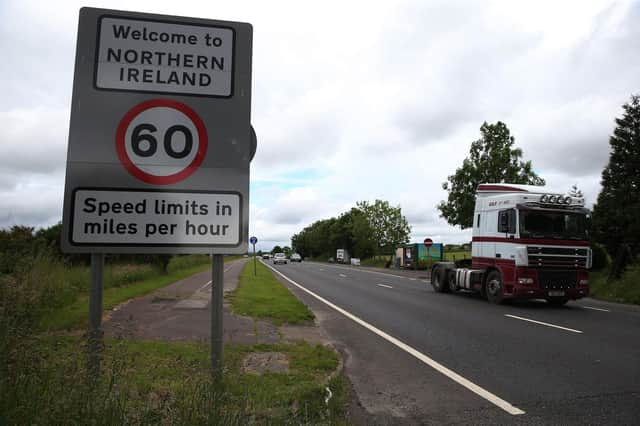Ben Lowry: Britain can subsidise Northern Ireland much more easily than the Republic could do but that is not the only argument for staying in the UK


(Click her to read it: ‘Leo Varadkar's nationalism was a reminder why Northern Ireland still needs the two-state solution’)
This caused some people on Twitter (now called X), such as the broadcaster William Crawley, to wonder what I meant by the term in a local context.
Advertisement
Hide AdAdvertisement
Hide AdI have used ‘two-state solution’ before in broadcasts and articles but given that I made it a key plank of my March 23 article I should have elaborated.
I mean that the Irish Question was partially resolved a century ago by agreeing to have two states on the island, one independent of the UK and one part of the UK.
It is not a perfect analogy with the Middle East, where the phrase two-state solution is most often used, because that plan would involve two sovereign states.
It is not even a full analogy with Cyprus (where, coincidentally, I was when the article was published a fortnight ago), because it too would (if agreed, which is unlikely) be two sovereign, independent states on the island (the Republic of Cyprus, in the south, and another republic in the Turkish Cypriot north), albeit two states with close links to Greece and Turkey respectively. I will write more about my Cyprus visit in the run-up to this summer’s 50th anniversary of the Turkish invasion (or intervention, as the Turks call it).
Advertisement
Hide AdAdvertisement
Hide AdNonetheless, there are two states on the island of Ireland, albeit only part of one of those states – the UK. It is an arrangement that has worked well, particularly in NI when the rest of Ireland struggled for the first 50 years after its breakaway. Now it is much more successful than it was, but the Republic remains a small country without the global clout of the UK.
The Irish nationalist claim that Northern Ireland was built as a Protestant country for a Protestant people is a gross simplification of what happened in 1921. The six counties on the island closest to Scotland had, for obvious reasons dating to the plantation, the most Protestants. It was the logical compromise and NI was no more a Protestant country for a Protestant people than were the 26 counties a Catholic country for a Catholic people.
Click here to read to a fascinating essay by Professor Brian Walker suggesting that James Craig might have welcomed Michelle O’Neill as first minister (I thought Prof Walker made a good case that Sir James might have welcomed a nationalist first minister but gave not enough weight to the likelihood that Craig would, like most unionists, have been appalled that we have a first minister who defends past IRA violence). In that March 20 essay Prof Walker put Craig’s “Protestant Parliament” quote in its full context of “in the south they boasted of a Catholic state”, which many commentators do not.
This week a report by highly regarded Institute of International and European Affairs (IIEA) in Dublin found that the cost of an all Ireland state would in its opening years be between €8bn (£6.9bn) and €20bn (£17.1bn) a year. That is not so different to the £9bn cost of the existing subvention to the UK Treasury (the gap between the cost of NI and the revenue it generates in taxes).
Advertisement
Hide AdAdvertisement
Hide AdIt is obvious that NI will be a huge drain on the Republic’s resources, and that Ireland, as a country of five million people, will find it much harder to absorb than does the UK, a country of almost 70 million people.
We have on these pages looked at other arguments about the Irish capacity to fund NI, such as Dr Graham Gudgin’s insistence that Irish wealth per person, and also its living standards, are over-estimated by its reliance on overseas companies. The IIEA report raises other points such as that Irish public sector pay is higher than in NI, exacerbating the cost of a single Irish state.
I think unionism makes two simultaneous mistakes on cost. The first is to be complacent and to rely on the assumption that it will win the day when both Brexit and the Scottish 2014 vote showed that people do not always vote on their wallet. Or even if they do, they can be persuaded as to where the money lies, such as the growing Scottish (I think ridiculous) belief that Scotland would actually be richer alone.
At the same time, unionists help to undermine the point that we do well under a wealthy UK. The UUP-DUP joint position with Sinn Fein that NI is being starved of money plays into the Irish republican claim that this is failed state which does not in fact have better services than the Republic, and that British callousness is to blame. Stormont is actually largely to blame for matters such as waiting lists because it has ignored expert advice on reforming the NHS, but many voters could just come to think that the UK and it NHS is the problem.
Advertisement
Hide AdAdvertisement
Hide AdSo the wealth argument should be balanced with other key points, such as the cultural problems with an all Ireland that is retrospectively embracing past IRA terror, points I touched on in my Varadkar article. Also dismantling the romantic idea that a geographical unit, an island, should be a single unit – a romantic notion that falls away when it comes to the island of Great Britain, which nationalists then want to see divided.
Ben Lowry (@BenLowry2) is News Letter editor